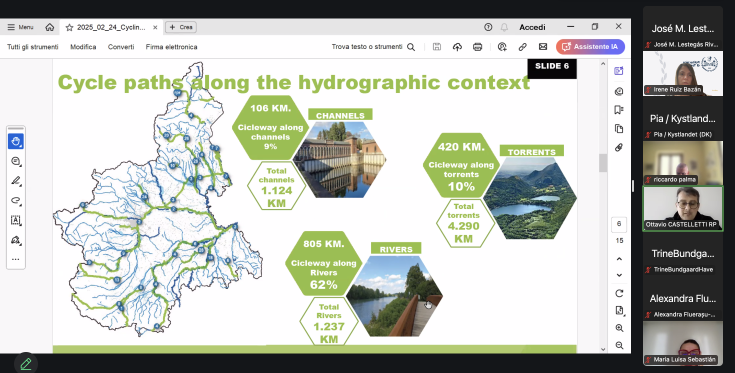Ensuring Safer Cycling Routes Along Waterways: 1st IEEE
Last 24th of February Interreg Europe CYCLING WATERWAYS project successfully held its first Interregional Event of Exchange of Experiences (IEEE) Online, focusing on a key challenge: ensuring safety along cycling routes in relation to waterways. The event brought together experts, policymakers, and stakeholders to discuss best practices, policies, and technical solutions aimed at enhancing safety and accessibility for cyclists navigating routes integrated with waterways.
Key Discussions and Insights
The event opened with an introduction by Riccardo Palma (Politecnico di Torino), presenting the CYCLING WATERWAYS project and its objectives in fostering safer cycling infrastructure. The first session featured a presentation by iRAP (International Road Assessment Programme), represented by Shanna Lucchesi and Leonid Ljubotina, highlighting international evaluation programs for cycling safety standards.
Following a short break, the discussion continued with a presentation of good practices across different European regions, wich included:
-
Spain: The integration of the new public bicycle system into municipal transport (Teresa Vicente Lozano, Zaragoza City Council)
-
Italy: The Regional Cycling Mobility Plan (PRMC) (Cristina Fabrizio, Piedmont Region)
-
France: Strategies for developing a primary and secondary cycling network (Xavier Larnaudie, Ardenne Metropole)
-
Denmark: Recreational cycling network qualification and the Længe Leve Horsens Fjord initiative (Pia Schildknecht Taylor, Destination Kystlandet)
-
Romania: Drobeta VELOCITY project for urban cycling (Alexandra Fluerasu, Drobeta Turnu Severin Municipality)
A second session addressed actions for cycling mobility, featuring strategies such as road safety plans, GIS mapping, and regional cycling network development from Spain, Italy, France, and Slovenia.
-
Spain: Road Safety Plan of Zaragoza (PSVUZ) (José Manuel Lestegás Rivas, Zaragoza City Council)
-
Italy: GIS mapping of the regional cycling network (Ottavio Castelletti, Piedmont Region)
-
France: AGGLO VELO: Equipping households with bicycles & supporting the local cycling industry (Xavier Larnaudie, Ardenne Metropole)
-
Slovenia: Gorenjska cycling network (Barbara Spehar, BSC Kranj)
-
France: Strategies for developing a primary and secondary cycling network (Xavier Larnaudie, Ardenne Metropole)
-
Denmark: Recreational cycling network qualification and the Længe Leve Horsens Fjord initiative (Pia Schildknecht Taylor, Destination Kystlandet)
-
Romania: Drobeta VELOCITY project for urban cycling (Alexandra Fluerasu, Drobeta Turnu Severin Municipality)
Spotlight on Waterways and Intermodal Mobility
The event also examined the role of waterways in cycling mobility, emphasizing intermodal solutions like Bike & Boat connectivity. Presentations included:
-
Slovenia: Enhancing coastal town connectivity through Bike & Boat (Barbara Spehar, BSC Kranj)
-
Romania: Integrating cycling infrastructure with sustainable waterway protection (Andreea Cirneanu, Dolj County Council)
Looking Ahead
The event concluded with a wrap-up session, reinforcing the need for continued knowledge exchange and cross-border collaboration. With insightful contributions from diverse regions, the CYCLING WATERWAYS project moves forward in its mission to improve cycling safety and promote sustainable mobility along Europe’s waterways.
Stay tuned for upcoming study visits and events that will further shape the future of cycling infrastructure!

